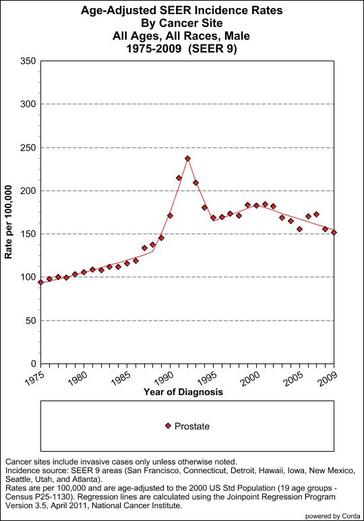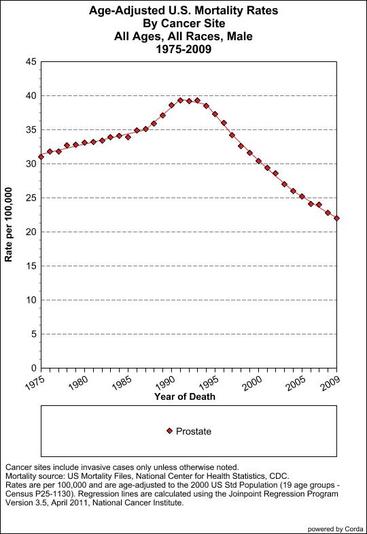It seems like every time you turn on the news or read the paper (yes, some of us still read newspapers), there is some new piece of information about PSA. What is PSA, anyway? PSA stands for prostate specific antigen. Beginning in the 1980's this blood test began to be used as a screening mechanism to identify prostate cancer at earlier stages. Before PSA testing began, all we had was the physical exam or other symptoms like bone pain, which typically found cancers rather late in the disease process. We now find the vast majority of prostate cancers very early and that has lead to quite a bit of discussion. Are we over-treating prostate cancer? Does diagnosis and treatment do more harm than good? Should we even be screening at all?
So what do we truly know about PSA testing as it relates to prostate cancer? Let's look at the incidence of prostate cancer before and after PSA testing began (these statistics are available online to all thanks to the SEER database):

The sudden increase in prostate cancer diagnoses in the late 1980's and early 1990's (the spike seen in the graph) resulted from increased and eventual widespread use of PSA testing. In recent years the incidence seems to be leveling off.
It's one thing to be diagnosing more cancers. The next question is what happened to prostate cancer mortality? In other words, how many people were dying from prostate cancer during this time?

The trend we see for death from prostate is one of the more striking ones we have seen with any type of cancer. For years, prostate cancer had been claiming an ever increasing number of lives. Along came PSA testing and after an initial upward swing - as a result of a sudden increase in the number of men being found to have cancer - death rates took a plunge. Year by year since that time death from prostate cancer has dropped.
Dramatic increases in survival combined with an increase in rates of diagnosed prostate cancer seems to be a very convincing argument that PSA testing has been very beneficial for men.
There are other factors at work. While early treatment for prostate cancer seems to be helpful, we need to understand that as cancer is now diagnosed much earlier than it had been a few decades ago, men will naturally live longer with their disease regardless as to what type of, if any, treatment were given. A number of studies have attempted to answer the PSA screening question but were poorly designed and executed and the validity of the results have been hotly debated. Teasing out how much of that downward swing is from statistical anomalies and how much is from saved lives has been a topic of much debate... and will not likely be definitively answered any time soon.
Dramatic increases in survival combined with an increase in rates of diagnosed prostate cancer seems to be a very convincing argument that PSA testing has been very beneficial for men.
There are other factors at work. While early treatment for prostate cancer seems to be helpful, we need to understand that as cancer is now diagnosed much earlier than it had been a few decades ago, men will naturally live longer with their disease regardless as to what type of, if any, treatment were given. A number of studies have attempted to answer the PSA screening question but were poorly designed and executed and the validity of the results have been hotly debated. Teasing out how much of that downward swing is from statistical anomalies and how much is from saved lives has been a topic of much debate... and will not likely be definitively answered any time soon.
As many of you have heard the USPSTF (United States Preventive Services Task Force) came out with a recommendation essentially against PSA testing. This has rightfully drawn sharp criticism. At the time of this posting, there are 16 members of this government committee, not a single one of which is a Urologist - the specialty charged with the care of men diagnosed with prostate cancer!
What is the bottom line? The AUA (American Urological Association) to which I belong believes that prostate cancer screening - with PSA testing - should be done annually beginning at age 40. I support that recommendation. More importantly, I support the right of each individual to have the ability to decide for himself whether or not he would like to be screened for prostate cancer and not have the decision made for him by a small government committee.
What is the bottom line? The AUA (American Urological Association) to which I belong believes that prostate cancer screening - with PSA testing - should be done annually beginning at age 40. I support that recommendation. More importantly, I support the right of each individual to have the ability to decide for himself whether or not he would like to be screened for prostate cancer and not have the decision made for him by a small government committee.

 RSS Feed
RSS Feed
